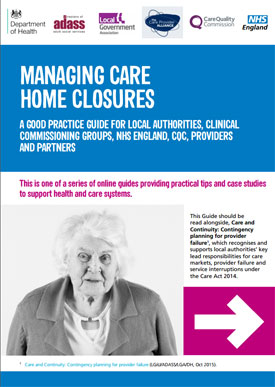The CQC published a good practice guide yesterday in a bid to minimise disruption to those affected by care home closures.
The publication, Managing Care Home Closures, comes after an event earlier this year, co-hosted by CQC and NHSE, which explored how unplanned care home closures are managed.
At this event it was agreed that a set of essential principles were necessary to ensure that service users, as well as their families and carers, are not harmed during the closure process.
Chief Executive of Action on Elder Abuse, Gary FitzGerald, said: “Closing a care home is difficult for residents at any time, but even more so when it has to be done at very short notice. If not handled effectively it can be a highly traumatic experience for those frail and vulnerable people affected, and it is therefore critical to get this right.
"We are consequently very pleased that CQC, and other partners, have acknowledged our concerns about these challenges and have addressed them in such a positive and collaborative manner. We would encourage all agencies to follow both the spirit and intent of this new guide, and we will obviously watch its implementation closely."
The CQC has worked in partnership with NHS England (NHSE), the Association of Directors of Adult Social Services (ADASS), the Local Government Association (LGA) and the Care Provider Alliance (CPA) to agree the guide.
It sets out how local and national organisations should coordinate action, avoid duplication and prevent confusion for people using services, their families and carers, care home providers and their managers and staff.
CQC’s Chief Inspector of Adult Social Care, Andrea Sutcliffe, said: “Care homes are people’s homes and they have every right to expect to live there for as long as they like. When a home closes unexpectedly, this can be a real shock for people, either for themselves or a loved one, which is why this will never be a decision that is taken lightly. As the regulator, it is CQC’s job to report on the quality of care that we find and our expectation is that providers will swiftly get to grips with any problems we identify.
“Sadly, there are sometimes urgent situations when it is absolutely in people’s best interests for us to use our powers so that people can move to a better environment quickly to experience the safe, high quality and compassionate care they deserve. These are rare events but they have to be managed well with the needs of residents, their families and carers guiding the actions of the different organisations and professionals involved.
“I am grateful to everyone who has been involved in developing the guide, particularly those who shared the experience of families affected by previous care home closures. I am confident that the guide will strengthen how organisations work together in these difficult circumstances for the benefit of those using services.”
The new guidelines dictate that when a care home closure situation arises, whether that is in response to poor care, or an emergency or market exit, organisations including local authorities, CCGs, NHSE, CQC, providers and partners must use an appropriate and detailed checklist to ensure the process is well coordinated.
The guide advises lead local authorities to appoint coordinators to oversee the relocation process, as well as a transport coordinator, publish marketing materials to inform the home about the planned closure and to assess residents’ health and care straight away after a closure is announced.
Regional Chief Nurse at NHS England, Margaret Kitching, said: “While we encourage people to do all they can to prevent care homes from closing wherever possible, when a care home is no longer able to continue providing a service its closure needs to be managed very carefully. The Care Quality Commission and the NHS, together with local government and others across the independent care sector, have worked to produce this guide to ensure closures are handled sensitively and are well-managed.”





















